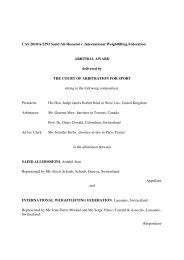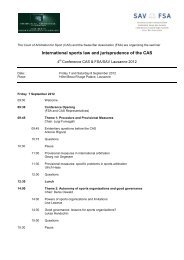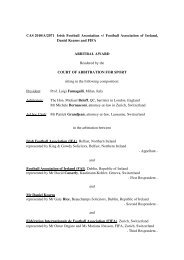(CAS) Bulletin - Tribunal Arbitral du Sport / TAS
(CAS) Bulletin - Tribunal Arbitral du Sport / TAS
(CAS) Bulletin - Tribunal Arbitral du Sport / TAS
You also want an ePaper? Increase the reach of your titles
YUMPU automatically turns print PDFs into web optimized ePapers that Google loves.
leads to a restraint of competition. Second, if there<br />
is a restraint of competition, they investigate whether<br />
there are legitimate business reasons justifying the<br />
restraint of competition (AMSTUTZ/CARRON, op.cit.,<br />
CA 7, N 57).<br />
In sports matters, the term “legitimate business reasons ”<br />
cannot be limited to economic reasons. The message<br />
of the Federal Council of 23 November 1994 to<br />
the Swiss Parliament regarding the CA refers<br />
to commercial principles which may constitute<br />
legitimate business reasons (Federal Council Message<br />
of 23 November 1994, BBL 1995, p. 569) and keeps<br />
the range open for a wider interpretation of the<br />
term, without explicitly taking into consideration the<br />
specifi city of sport. In sports matters, the behaviour<br />
of sports associations must be legitimated by reasons<br />
that are necessary for the proper functioning of the<br />
sport in order to qualify as “legitimate business reasons ”<br />
(PHILIPP P., Kartellrecht und <strong>Sport</strong>, Jusletter, 11 July<br />
2005, para. 36).<br />
The UEFA Appeals Body, in its decision dated<br />
13 September 2011, considered that OLA fi elded<br />
players in the qualifi cation matches that were<br />
ineligible under the UEL Regulations. Due to this<br />
violation of the UEL Regulations, the matches<br />
against Celtic FC were declared forfeit against OLA<br />
and as a consequence OLA has been excluded from<br />
the UEL 2011/2012.<br />
The rights, <strong>du</strong>ties and responsibilities of all parties<br />
participating and involved in the preparation and<br />
organisation of the UEL 2011/2012, including the<br />
qualifying phase and the play-offs, are governed<br />
by the UEL Regulations. According to the UEL, a<br />
football club participating in the UEL 2011/2012 is<br />
allowed to fi eld eligible players only (cf. Article 18 of<br />
the UEL Regulations for details). In case a football<br />
club violates these regulations, UEFA is entitled to<br />
render a sanction, in particular to declare the matches<br />
forfeited.<br />
Article 18 of the UEL Regulations authorizing UEFA<br />
to sanction a club which is fi elding ineligible players is<br />
a rule to guarantee the effi ciency and equal treatment<br />
of the clubs participating in the UEL 2011/2012.<br />
3.5.1 No refusal to enter into business relationship<br />
(Article 7 para. 2 lit. a CA)<br />
UEFA did not refuse to allow OLA compete, that<br />
is to say to enter into a transaction according to<br />
Article 7 para. 2 lit. a CA. In fact, OLA participated<br />
(successfully) at the UEL 2011/2012.<br />
However, Respondent fi elded players that were<br />
ineligible according to the relevant regulations. As<br />
UEFA pointed out in its Statement of Claim the<br />
fact that OLA fi elded players who were not properly<br />
registered is the source of the forfeit sanction.<br />
The exclusion from the group phase of the UEL<br />
2011/2012 by UEFA was solely based on the fact that<br />
OLA competed with players that were ineligible.<br />
3.5.2 No discrimination of OLA (Article 7 para. 2<br />
lit. b CA)<br />
There is no indication of any discriminatory behaviour<br />
of UEFA, as UEFA applied the UEL Regulations to<br />
all (potential) participants of the UEL 2011/2012 and<br />
treated each football club in the same way.<br />
There is no indication that UEFA would not have<br />
imposed the same sanction, i.e. to declare the matc hes<br />
forfeit based on Article 14bis para. 3 of the UEFA<br />
Disciplinary Regulations Edition 2011 (the “UEFA<br />
DR”), to other clubs it had imposed to OLA.<br />
As no unequal treatment of OLA by UEFA has<br />
been substantiated let alone proven, there is no<br />
discrimination of OLA in the sense of Article 7<br />
para. 2 lit. b CA.<br />
3.5.3 No abuse of UEFA’s dominant position<br />
pursuant to the general clause (Article 7 para. 1<br />
CA)<br />
The fact that UEFA issued the UEL Regulations<br />
cannot be considered as an abuse of its dominant<br />
position in the market. The regulations, and in<br />
particular the rules for the eligibility of football<br />
players, serve to guarantee a proper functioning of<br />
the football competition within the UEL 2011/2012.<br />
With regard to the eligibility of the players, the UEL<br />
Regulations intend to ensure that all football clubs in<br />
Europe respect the identical rules, in particular the<br />
rules related to transfers. The main intention of the<br />
UEL Regulations is to ensure the equal treatment of<br />
the clubs.<br />
Taking into consideration the principle of<br />
proportionality, the Panel does not see any alternative<br />
regulat ion to the UEL Regulations. The declaration<br />
of matches as forfeited, in which ineligible players<br />
were involved, is a proportionate measure that cannot<br />
be achieved with another sanction such as a fi ne or<br />
a de<strong>du</strong>ction of points. The absence of alternatives is<br />
evident particularly <strong>du</strong>ring the qualifi cation phase of<br />
the tournament, where the de<strong>du</strong>ction of points are not<br />
possIt results from the above that UEFA, by issuing<br />
the UEL Regulations, did not abuse its dominant<br />
market position according to Article 7 para. 1 CA.<br />
Jurisprudence majeure / Leading cases<br />
-<br />
197





